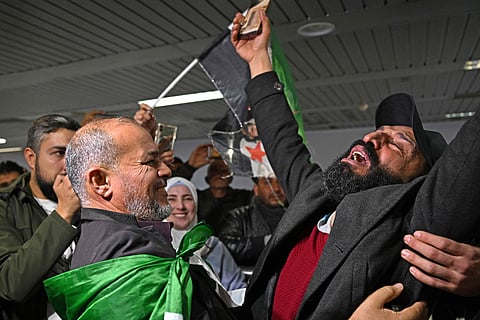US temporarily eases some Syria sanctions
Treasury will continue to support humanitarian assistance and responsible governance

WASHINGTON: The United States has announced that it was providing additional sanctions relief on some activities in Syria for the next six months to ease access to basic services following the fall of strongman Bashar Al Assad.
The US Treasury said it had issued a new general licence to expand the allowed activities and transactions with Syria while Washington continues to monitor developments under the Islamist-led rebels who overthrew Assad last month.
The move was made “to help ensure that sanctions do not impede essential services and continuity of governance functions across Syria, including the provision of electricity, energy, water, and sanitation,” the Treasury said in a statement.
Monday’s actions build on existing authorisations that support the work of international organizations, non-governmental organizations, and humanitarian and “stabilization efforts” in the region, it said.
“The end of Bashar Al Assad’s brutal and repressive rule, backed by Russia and Iran, provides a unique opportunity for Syria and its people to rebuild,” said deputy Treasury secretary Wally Adeyemo.
“During this period of transition, Treasury will continue to support humanitarian assistance and responsible governance in Syria,” he added.
The transitional government in Damascus has been lobbying to have sanctions lifted.
But the international community has been hesitant to roll back restrictions, and many countries - including the United States - have said they are waiting to see how the new authorities exercise their power before doing so.
The Treasury Department emphasized that it had not unblocked any property or other interests of people or entities currently on its sanctions blacklist.
This includes Assad and his supporters, the Syrian central bank and Hayat Tahrir al-Sham, a former Al-Qaeda offshoot that played a key role in toppling the former government.
It also does not authorize “any financial transfers to any blocked person other than for the purpose of effecting certain authorized payments to governing institutions or associated service providers in Syria,” the Treasury said.
First Qatari flight in 13 years
The first Qatari commercial flight in nearly 13 years landed in Damascus on Tuesday, AFP correspondents said, as international traffic resumed at Syria’s main airport.
The Qatar Airways plane took off from Doha and landed at around 1:00 pm (10:00 GMT), not long after the airport’s first outbound flight took off headed for Sharjah in the United Arab Emirates.
Syria plans ‘expanded’ panel to prepare national dialogue
Meanwhile, Syria’s new authorities are to set up an inclusive committee to prepare for a “national dialogue conference” to discuss the future of the country, Foreign Minister Asaad Al Shaibani said on Tuesday.
Since toppling president Bashar Al Assad nearly a month ago, Syria’s Islamist-led rulers have spoken of a “national dialogue conference” to map out the transition, without specifying a date.
On a visit to Jordan, Shaibani said that the interim authorities had initially intended to hold the conference in early January, but instead, “we chose to form an expanded preparation committee” that would meet at an unspecified date.
The committee would “include men and women... able to fully represent the Syrian people” across “all segments of Syrian society and provinces”, the foreign minister said.
The new leaders, who ended the Assad clan’s five-decade rule on December 8, have repeatedly sought to reassure Syrians as well as the international community that they would uphold minority rights.
Many Syrians have feared that the Islamist rulers would establish a religious state that could marginalise women and minorities.
Shaibani said: “We in Syria are a diverse country, and we can either regard this diversity as an opportunity... and a source of strength, or as a problem.”
“If we view it as an opportunity, we can benefit from everyone in building this country,” he said.
“We don’t view Syria as anything but a united Syria” for “all its people”, said Shaibani.
“We won’t succeed if we do not follow this course.”
Of the actual national dialogue meeting, he said: “We want this conference to represent the will of the people, and we consider it a cornerstone of future Syria”.
The Islamist group that spearheaded the offenvise that ousted Assad, Hayat Tahrir Al Sham (HTS), has roots in Syria’s Al Qaia branch. Many governments including the United States have proscribed it as a “terrorist” organisation.
But HTS has sought to moderate its rhetoric and vowed to protect Syria’s religious and ethnic minorities since seizing power.
Leader Ahmed Al Sharaa told Al Arabiya TV in late December that HTS would announce its dissolution “during the national dialogue conference”.
He also said elections in Syria could take four years, and rewriting the constitution alone could take “two or three years”.
Visiting foreign diplomats in Damascus have repeatedly stressed the need for an inclusive, peaceful transition.



